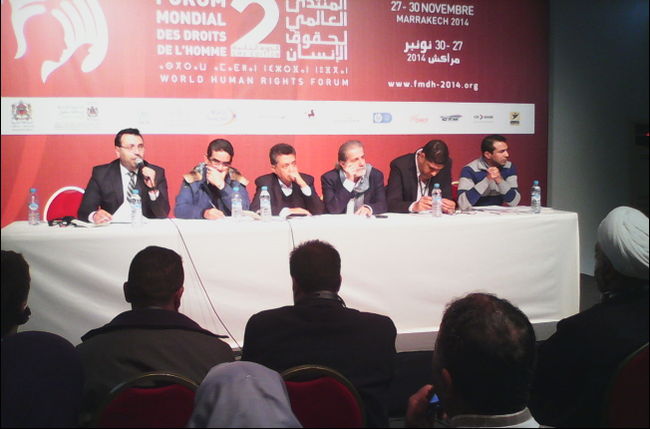Magharebia/Hassan Benmehdi
More than 5,000 people attend the three-day World Human Rights Forum in Marrakech from November 27th-November 30th.
Lebanese singer artist Marcel Khalifa and other activists gather for the Marrakech World Human Rights Forum.
The World Human Rights Forum (WHRF) in Marrakech was packed to capacity on the rainy morning of Saturday (November 29th).
Lebanese singer Marcel Khalifa joined academics, human rights activists, political leaders and students at the Moroccan event to decry growing intolerance in the Arab Muslim world.
Khalifa, the guest of honour at the debate, is also a United Nations Peace Ambassador. He reminded the audience there could be no culture without freedom: “Artists and cultural creativity have to deal with political, religious and societal authorities.”
Vian Dakheel Saeed, a human rights activist and representative of the Yazidi minority in Iraq, was unable to come to Marrakech to talk about the bitter experience of her community at the hands of Daesh.
In a video broadcast to the audience, the Iraqi MP tearfully recounted how the Islamic State terrorist organisation was torturing and massacring her people in the name of God and Islam.
“They kill us because we are culturally different,” she said.
Haitam Munir, an international lawyer from Jordan, agreed that a culture of tolerance and respect for others needed to be promoted within Muslim society.
“I find it unthinkable that Jordanian law severely penalises any citizen who has chosen a religion other than Islam,” he said.
Takfirism is gaining ground at the expense of exchange and dialogue, noted sociologist Soumaya Naamane Guessous.
“We don’t want our society to become even more reactionary,” she said, noting that efforts were needed to protect young people from “all forms of extremism”.
Algerian sociologist Arous Zoubir said: “Rejection of others is one of the serious ills of the Maghreb region, our society and our civilisation.”
Freedom of conscience is not a priority in public policy in Algeria, he noted.
“The word ‘apostasy’ is not mentioned in Tunisian law and a judge does not have the right to ask taxpayers what their religion is,” professor Ali M’zgari told the forum.
This freedom is not respected in Mauritania, according to activist Lalla Aicha.
In her view, her country’s law is harsh and firm when it comes to Mauritanians’ choice of religion. “In Mauritania, the constitution stipulates that all Mauritanians are Muslims,” she explained.
Freedom of conscience in Morocco is a process that is not complete, said anthropologist Mohamed Sghir Janjar.
“Moroccan law is completely silent about freedom of conscience and religious diversity,” he said.
The Damir association organised the panel discussion to promote respect for freedom of religion and conscience.
The failure to respect this freedom fosters a culture of rejection and discrimination and encourages violence and terrorism, Damir said in a statement.
The organisation called for religions to co-exist and for civil society to rally against all takfirist ideology.





